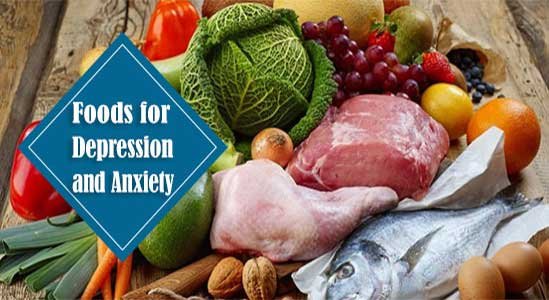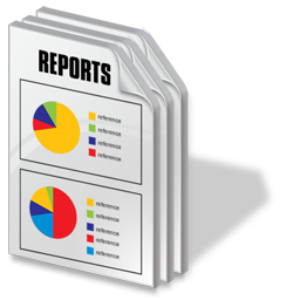
Foods for Depression and Anxiety: Every year, millions of people have been suffering from depression and anxiety around the world.
Using medications for the treatment of depression may be useful, but they are actually temporary and may even have many side effects.
The best way to stop depression and anxiety is by changing your lifestyle and eating healthy foods.
Here, we will inform you about the foods for depression and anxiety that you should or shouldn’t eat.

Statistics of Depression and Anxiety:
According to a study by the World Health Organization(WHO), more than 350 million people have been suffering from depression and anxiety worldwide.
The American Alliance of Mental Illness revealed that about 15 million people have been suffering from depression and anxiety yearly.
The Anxiety Disorder Association of the US also calculated that anxiety disorders affect approximately 40 million people every year.
Some issues can occur with depression and anxiety, as well as foods. It has been exposed that foods are closely connected to depression and anxiety.
Read More: 8 Causes of Teenage Depression: Especially for College Students
Therefore, some foods may help to fight depression and anxiety, whereas other kinds of food occur these mental disorders.
That is the purpose why today I want to share with you the list of good foods for depression and some bad foods to avoid with an anxiety disorder.
Eat These Best Foods for Depression and Anxiety:
- Chocolate:
Chocolate is one of the right foods that reduce anxiety and depression because it can improve your mood.
Just a small piece of dark chocolate helps to release your calm-inducing hormone “serotonin” that makes relaxes the blood vessels of your circulatory system.
For this reason, dark chocolate can be listed as the right food for depression and anxiety.
According to a study from the University of California, San Diego, School of Medicine, consuming chocolate in control makes you’re feeling better.
As well as, dark chocolate helps to lower our blood pressure level, calm down your feeling.
- Oatmeal:
Oatmeal is one more good food to stop anxiety disorder.
It helps to produce “serotonin” that prevents stress, anxiety, and depression by creating a calming effect.
The higher soluble fiber presence in Oatmeal stays for a long time in our digestive system.
That means, their calming effect will last longer.
- Turkey:
You may be astonished to hear that after taking Thanksgiving dinner, the sleepy feeling you get is as a result of turkey.
Most of the lean protein sources are excellent foods for depression and stress.
However, turkey has a higher volume of amino acid called tryptophan.
It is advised that tryptophan can have positive effects on depression and anxiety by producing serotonin in our brain- a natural good feeling chemical that makes calmness and even sleepiness.
Read More: Home Remedies for Depression: 5 best Depression Home Remedies
- Spinach:
A great source of magnesium in spinach helps you to control cortisol levels, keeps you feeling good.
Add spinach to your salad or sandwich.
You also can add spinach to your breakfast meals or may add some spinach leaves to your soup.
- Salmon:
There is no better source of omega-3 fatty acids than you can get in salmon.
Omega-3 fatty acids are verified to stop depression and anxiety. Because they help to keep adrenaline and cortisol from spiking if you feel restless.
Salmon is not only a good diet for depression and anxiety but also good for your overall health too.
Salmon helps to decrease irritation and improve your blood circulation, which drops the possibility of heart disease.
Eating at least 4 ounces of salmon three times a week helps to protect your heart when those stress hormones are rolling.
- Oranges:
Oranges are one more good food for depression and anxiety due to having plenty of vitamin C in it.
This vitamin helps to drop your blood pressure level and decrease the stress hormone cortisol.
Just eat an orange or drink a glass of orange juice to get a rapid burst of vitamin C.
- Cashews:
Cashews are filled with a higher volume of zinc content that keeps your feeling in good condition.
The lack of zinc in the body is connected to both depression and anxiety.
A 1-ounce serving of cashews can give 11% of zinc of your suggested dietary allowance.
Read More: Top 11 Herbal Remedies for Depression and Anxiety
- Almonds:
A significant amount of vitamins B2 and E in almonds are regarded as one of the good diets for depression and fatigue in this list.
Almonds help release stress by improving your immune system in stress.
It is suggested that eating 65 grams of almonds daily can help in depression treatment.
- Walnuts:
A great source of omega-3 fatty acids in walnuts contains heart-healthy monounsaturated fats and protein that helps to decrease the symptoms of depression and anxiety.
And more, polyphenols and alpha-linolenic acid in walnuts help you stop memory loss.
- Berries:
Similar to oranges, berries like blackberries, strawberries, raspberries, and blueberries contain a significant amount of vitamin C, which is confirmed to fight depression and anxiety effectively.
German scientists showed a study on 120 people by asking them to give a speech and then do severe mathematics problems.
The outcomes got that people who had been given vitamin C had lower levels of blood pressure and cortisol after the stress test.
The higher level of antioxidant and anthocyanin presence in berries proved as the good foods for depression and anxiety that helps to protect and to repair cells at what time you are stressed.
Should Not Eat These Bad Foods for Depression and Stress:
- Spices:
Spices like chili powder or cayenne pepper contain salicylates, which increase metabolism.
Therefore, you may feel stressed.
- Sweeteners:
Who doesn’t like sweets? People think that having sweets can make them better feelings, but it’s temporary.
Sugar is absorbed rapidly through the circulation, causing an initial flow of energy.
But that flow stops while your body increases insulin production to flush out the sugar of your bloodstream. As a result, you feel stress.
Besides, artificial sweeteners are bad foods for depression and anxiety. Because artificial sweeteners cause headaches, drop mood by blocking the creation of the neurochemical serotonin.
- Processed Foods:
Processed foods, for example, canned food, pre-packaged dehydrated foods, and fast food contain a higher volume of saturated fat, preservatives, artificial flavors, and sodium that provide stress on your body.
Eating processed food has bad effects on your liver and colon also.
- Salt:
Potassium is an essential mineral to work our nervous system properly.
Unluckily, salt decreases the volume of potassium in your body. Besides, it puts stress on your system by increasing blood pressure, triggering anxiety.
Some of the high sodium fat-free foods are also bad for depression and anxiety.
For this reason, the higher amount of sodium in these foods can disturb your nervous system and blunder your immune system reply, causing in tiredness and depression.
Read More: 8 Best Essential Oils for Depression that Boost Your Mood
- Low-Fat Dairy Foods:
Overeating low-fat dairy foods may create excess calcium in the body, which decreases magnesium levels. The lack of magnesium can create both physical and mental stress by leaving the stress hormone called adrenaline.
- Caffeine:
As stimulating food, caffeine can increase energy levels; however, it is a kind of dangerous food for depression and anxiety.
Caffeine can boost the adrenaline in your system, causing the “fight or flight” protection mechanism, which causes depression and anxiety.
Furthermore, highly caffeinated foods and drinks can keep you awake, or you can have sleeplessness.
Keep in mind, your body needs sleep to be fit for a long day, as well as it keeps you in a good feeling, but sleeplessness means you cannot rest enough, causing tension, depression, and anxiety over and over again.
- Alcohol:
If people are stressed or depressive, they tend to drink alcohol. Because they think it can give comfort.
Alcohol is not only damaging stuff but also one of the wrong foods for depression and anxiety.
Alcohol may provide good feelings temporarily.
Ultimately, alcohol is a sedative.
Through the right mind, your brain takes the information, analyses, and processes to control your mechanical function in realizing, thinking, reasoning as well as reacting.
Alcohol slows down all these processes, make the symptoms of depression and anxiety.








